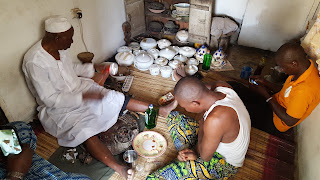Babalawo and the issue of Sanctimony
Yesterday I posted on Who is an apetebi?: Her dos and don'ts.
Today, am posting on Babalawo and the issue of sanctimony which has some similarities with the dos and don'ts of the Babalawo
Babalawo is a combination of two words. 'Baba' which means father and 'alawo' which has the pre-fix of 'al' meaning the owner or head while 'Awo' means the secret of knowledge, especially the esoteric. Babalawo is a term used to describe a person who possesses knowledge of the secrets of the universe.
He is supposed to have gone through several years of tutelage under a proficient awo. At the end of his training program, he is supposed to attain a high level of spirituality, discipline, and reversed and respected status in society. As part of his attributes, he is meant to be meek, gentle, well endowed, well tutored, pious, trustworthy, highly cultured, and knowledgeable. Ifa regards Babalawo as the emissary of Olodumare who through IFA helps to pass the message of Olodumare to the earth.
Ogunda-Odi describes how greatly endowed a baba is vis-a-vis his several years of tutelage, experience, and expertise in the art of Ifa practice.
As a Babalawo, one needs to behave meekly and desist from any act of violence and unbridled behavior. Gentility and humility must be part of his character.
He must always reflect a high sense of wisdom in all his dealings. He is expected to exhibit all forms of piety, maturity, patience, discipline, and humility.
Moreover, a Babalawo is supposed to o be someone who mends or rescues a bad situation and also proffers a solution to it. As a society.
By virtue of profession of Babalawo in the society, he divines or consults with Ifa, prescribes necessary editions and performs the solutions and performs the solution usually in form of ebo and ibi (propitiation) in shrines, homes, or any other place as directed by Ifa. This practice had been going on for several millennia up till this present moment.
The form and nature of shrines had not witnessed any major change structurally and sanctimoniously. It is expected that by now, the structure of African shrines should have improved in relation to the dictates of modern times. The major aspect, which ought to have improved, is the sanctimony of shrines. It is worrisome that the disgusting and repulsive sight of decayed sacrificial items blood, overgrown weeds, dirt, files, etc characterized most shrines, especially in Africa.
Shrines are known to be holy places of worship, veneration, or propitiation usually regarded as a spiritual sanctum whereby individuals go to commune with the deities /invisible world. Usually, the communion is done through various deities whom people use as a conveyor belt to the supreme deity, Olodumare.
Most shrines are treated with levity and an uncaring attitude leading to the absence of personal and environmental hygiene on the part of practicing priests. Lack of hygiene does not only expose one rewarding spirit who hitherto would have insisted on attaining high spirituality.
As far as Ifa is concerned, a Babalawo is noted to possess among other essential virtues that are regarded as sin qua-non (essential) in Ifa practice. They are: Physical purity and Spiritual purity.
Physical purity:
This involves the personal and environmental hygiene on the part of the Babalawo or the priest performing Ebo or propitiation in the shrine. It goes a long way in creating a sound and pleasant environment for good things to flourish. In such situation, diseases or any form of bacteria have little or no chances of attacking those within the vicinity.
This involves the personal and environmental hygiene on the part of the Babalawo or the priest performing Ebo or propitiation in the shrine. It goes a long way in creating a sound and pleasant environment for good things to flourish. In such situation, diseases or any form of bacteria have little or no chances of attacking those within the vicinity.
In the same vein objects or symbols of Orisa including shrines also possess a high degree of potency when it comes to the issue of sanctimony. Worshiping, propitiating, praying, and performing ebo/ rituals in a place considered to be filthy and unhygienic are regarded as sacrileges.
Spiritual purity :
This is the thorough sanctification of the mind and soul of the suppliant or the Babalawo, who must at all times maintain peace of mind, and eschew evil thoughts and intentions. The difference between Physical and Spiritual purity is that while physical purity deals with both the suppliant or the presiding Babalawo and his immediate environment, spiritual purity deals mainly with the suppliant or the Babalawo.
This is the thorough sanctification of the mind and soul of the suppliant or the Babalawo, who must at all times maintain peace of mind, and eschew evil thoughts and intentions. The difference between Physical and Spiritual purity is that while physical purity deals with both the suppliant or the presiding Babalawo and his immediate environment, spiritual purity deals mainly with the suppliant or the Babalawo.
Spiritual purity is more or less invisible feelings, thoughts, and actions of an individual. This aspect is much stronger and has a high degree of potency on the efficacy of prayer or request from the Supreme Deity. Ifa enjoins us to always think food and fee minds of all forms of negative thoughts that may result in malice, jealousy, hatred, anger, cheating, murder, etc. All the according to ifa are capable of delaying answers to prayers or requests from Olodumare.
In conclusion, the sanctity of any prayer, supplications, propitiation, or veneration is not Colette until one has a forgiving heart. This means In essence that a Babalawo or any other person involved must forgive those who have trespassed against him. Ifa went further that one should pray for his enemies even in the face of confrontation. Ifa believes that an enemy today may become a friend and of benefit later in the future. Vengeance is of Olodumare.!!
Aboru Aboye
Oloye Fakunle Oyesanya
Elerii ipin magazine (2005 edition)
Oloye Fakunle Oyesanya
Elerii ipin magazine (2005 edition)






Comments
Post a Comment